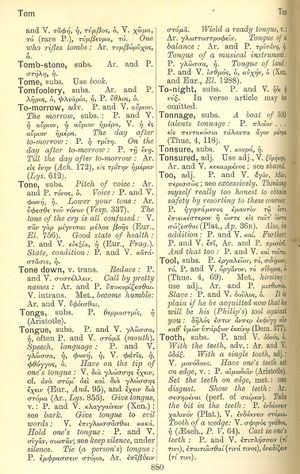tome: Difference between revisions
From LSJ
οὐ μακαριεῖς τὸν γέροντα, καθ' ὅσον γηράσκων τελευτᾷ, ἀλλ' εἰ τοῖς ἀγαθοῖς συμπεπλήρωται· ἕνεκα γὰρ χρόνου πάντες ἐσμὲν ἄωροι → do not count happy the old man who dies in old age, unless he is full of goods; in fact we are all unripe in regards to time
(3_13) |
m (Woodhouse1 replacement) |
||
| Line 1: | Line 1: | ||
{{Woodhouse1 | {{Woodhouse1 | ||
|Text=[[File:woodhouse_880.jpg|thumb|link={{filepath:woodhouse_880.jpg}}]] | |Text=[[File:woodhouse_880.jpg|thumb|link={{filepath:woodhouse_880.jpg}}]] | ||
===substantive=== | |||
Use | Use [[book]]. | ||
}} | }} | ||
{{Lewis | {{Lewis | ||
Revision as of 09:15, 20 May 2020
English > Greek (Woodhouse)
substantive
Use book.
Latin > English (Lewis & Short)
tŏmē: ēs, f., = τομή,>
I a cut, separation; in metre, the cæsura, Ter. Maur. p. 2440 P.; Aus. Ep. 4, 90.
Latin > French (Gaffiot 2016)
tŏmē, ēs, f. (τομή), césure : Aus. Ep. 4, 90 ; Ter. Maur. 2440.
Latin > German (Georges)
tomē, ēs, f. (τομή), der Abschnitt, im Verse, Auson. epist. 4, 90. p. 162 Schenkl.

